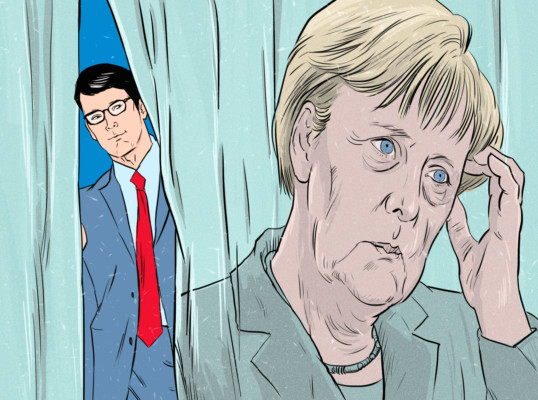
After reaching a hard-fought coalition agreement, both of Germany’s major political parties are at a nadir: They’ve never been so unpopular, and wouldn’t manage to scrape together a majority if a new election were held today. Germany, though, is one among many democracies where the political system is feeling old and tired: Throughout the West, a generational change appears to be overdue.
The German political system, set up after the Second World War with the active participation of the war’s western winners, is one of the most modern and rationally designed ones in the world. Though the absence of term limits for elected officials may look somewhat undemocratic to people used to such restrictions, such as US citizens, it’s standard European practice and it’s geared toward sustaining peace — an important goal given Germany’s history. At least one piece of recent research shows that countries with term limits are more conflict-prone: Lame duck leaders tend to feel less accountable.
This design advantage, however, does have a flip side: The strong incumbency advantage gets in the way of renewal in parties that get access to governing. The party membership grows older along with the leaders who stick around. In 2006, some 47 per cent of the members of recently elected Chancellor Angela Merkel’s conservative Christian Democratic Union party and 45 per cent of the members of its coalition partner, the Social Democratic Party (SPD), were 60 or older. In 2016, with the same parties forming the government, 51.5 per cent of CDU members and 54.3 per cent of SPD ones were older than 61.
That swift ageing of the loyal base worries the parties’ younger supporters: It’s no accident that Kevin Kuehnert, the 28-year-old leader of the SPD’s youth wing, has waged a relentless campaign within the party ranks against a new CDU-SPD “grand coalition”. He’s worried he and others like him have no future in what is increasingly a party of old people. Will it even be relevant by the next election?
Today, top SPD figures want to hand over the party’s leadership from 62-year-old Martin Schulz, unpopular with the membership since leading the SPD to its worst ever election result last September and condemned for using the coalition talks to wangle the coveted post of foreign minister. Andrea Nahles, the 47-year-old head of the SPD parliamentary faction, a passionate speaker popular with the party’s left, was the designated successor; but 41-year-old Flensburg Mayor Simone Lange inserted herself into the process, saying SPD members were entitled to a vote rather than a back room deal. This is another symptom of the younger Social Democrats’ unease and thirst for some kind of renewal — if not quite for a suicidal rejection of the coalition agreement.
Although there is no Kuehnert equivalent in the CDU, its youth-wing leader, Paul Ziemiak, 32, has recently been shedding his reputation for niceness and allying himself with 37-year-old Jens Spahn, in whom much of the party base vests great hope. Spahn is tougher than Merkel on immigration and attractive to more liberal voters. Influential voices within the CDU are calling for a leadership change before the next election, which would elevate Spahn and 44-year-old Daniel Guenther, now first minister of the northern state of Schleswig-Holstein.
Merkel, 63, who has repeatedly stated her intention to serve the full four-year term as chancellor, promised last week to foster a process of generational change in the party, offering “chances to people whose political future lies before them or who are in mid-career”. That means there may be some younger faces than expected in the next Cabinet and in top party positions.
The question is whether younger politicians will be able to shift the mammoth parties towards a more modern agenda, including better handling of digitisation, an education reform to bring Germany up to speed with current trends and more environmental awareness. So far, more marginal parties — the liberal Free Democrats (FDP) and the Greens, with an average age of members closer to 50 than to 60 and leaders who are younger than that — have a better grasp of these issues. FDP leader Christian Lindner, 39, has named the CDU’s inability to modernise as one of the reasons earlier coalition talks between him, Merkel and the Greens had fallen through.
If Merkel fails to enable a generational shift as promised, the smaller parties may have their chance in the 2021 election. Even now, there’s not much distance between them and the SPD in the polls. It should be noted that far-right AfD is also younger than the established parties, although there are no official age data for it yet.
Throughout the western world, establishment parties’ leaders are often too old and too set in the ways of traditional politics. That’s one of the reasons young disrupters such as President Emmanuel Macron in France and Albert Rivera, the 38-year leader of the upstart Ciudadanos party in Spain — according to some polls, the country’s leading party today — are successful in breaking centrist moulds. It’s also why 31-year-old Austrian Chancellor Sebastian Kurz found it so easy to take over an established centre-right party and win an election with it last year. Canada’s Prime Minister Justin Trudeau and New Zealand’s Prime Minister Jacinda Andern are part of the same trend.
It’s not happening in many other countries yet (Britain’s Tories are still hopelessly grey), but now that even the German iceberg is beginning to melt, generational change will start rolling across Europe. Eventually, it may even reach the United States.
— Bloomberg
Leonid Bershidsky is a Bloomberg View columnist. He was the founding editor of the Russian business daily Vedomosti and founded the opinion website Slon.ru.










